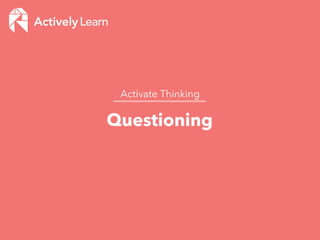
Asking effective questions
- 2. Great questions are the starting point for robust discussion and critical thinking. They help guide the students' focus and deepen learning.
- 3. In the context of a reading assignment, great questions can also define purpose, deepen comprehension, and help students to make connections across ideas.
- 4. So how can you ask great questions?
- 5. Action #1: Tie your questions to a clear objective.
- 6. Before you begin to write questions, ask yourself what you want students to get out of the text. Figure out why the colonists declared independence from Great Britain. Understand how the parts of a cell work together. Analyze character development. Identify the elements of satire.
- 7. Imagine that you are a struggling reader who has trouble figuring out the main idea of a text. Does this series of questions help to guide your reading? Identify one figurative device from this paragraph. What are the major themes in this text? What does the character's diction say about him? Diagram the structure of this narrative.
- 8. Your questions should serve as a roadmap to reach the objectives you set out. Avoid questions that seem random or that distract from the objectives.
- 9. Action #2: Build toward higher levels of complexity. Question complexity is different from question difficulty. Difficulty refers to the likelihood that students will answer the question correctly. Complexity refers to the level of thinking, number of steps, or the abstractness of the task.
- 10. Webb’s Depth of knowledge (DOK) offers a useful schema for thinking about cognitive complexity.
- 11. Complexity = Difficulty You can ask students questions that are low- difficulty but high-complexity and vice versa. For example, you could ask them to design a project around a concept that they are familiar with. The project will require several steps (high-complexity), but they will likely be successful because they understand the material (low-difficulty). /
- 12. Teachers tend to ask far too many low-complexity questions. 90% 90% of teachers' questions focus on lower- order skills such as memorization and recall. Source: http://teaching.uchicago.edu/teaching-guides/asking-effective-questions/
- 13. It's fine to start with surface- or lower- order questions to help students understand the basic ideas. But the goal is to use that surface learning to go deeper. Surface-level learning Deeper learning
- 14. The biggest reason to favor higher- order questions is that they are more engaging for students and provide more interesting answers. These questions lead to discussion and debate because they are open to interpretation. They also enable students to think more deeply because they require students to construct meaning rather than merely identifying information in the text.
- 15. Ask higher-order questions to your struggling students because it gives them flexibility to choose among different ways to answer and support his or her reasoning. Lower-order questions typically have one correct answer, which narrows the approaches that a student can use.
- 16. What are the steps of the scientific method? When did the United States enter World War II? What was Hamlet's relationship to Claudius? Examples of lower-order questions Examples of higher-order questions Why was the US reluctant to enter WWII? Why does Hamlet take so long to get revenge? Design an experiment using the scientific method.
- 17. Action #3: Ask one question at a time Multi-layered questions are confusing for students, because it's not clear which question you want them to answer. "What does 'checks and balances' mean? How does the federal government impose this concept between the executive, the legislative, and the judicial branch? What is the rationale behind this system?"
- 18. These types of questions are great to use as a series during class discussion, but for written questions, stick to one at a time. "How does the federal government impose checks and balances between the executive, the legislative, and the judicial branch?"
- 19. If you need to clarify your question, do it in a follow- up statement. "Does the author provide sufficient evidence to justify her reasoning? In your answer, consider her use of data and her rebuttal of the counterargument."
- 20. Action #4: Vary the types of questions you ask to enable students to think in new ways and practice a variety of cognitive skills. Don't fall into the habit of repeatedly asking the same questions and focusing on the same set of skills.
- 21. One way to avoid this is to research question stems. A simple online search for subject-specific questions can yield great inspiration.
- 22. Review your questions to see if you notice any patterns. Aligning your questions to standards may make this even more apparent.
- 23. Questions are the currency of education. Make them count!